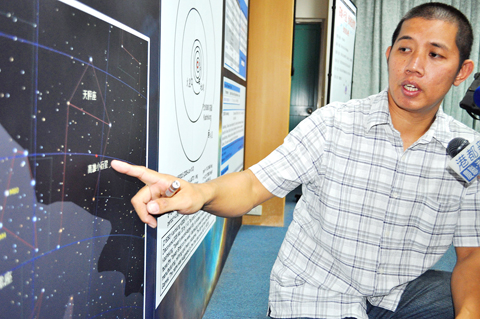An amateur astronomer who discovered an asteroid earlier this year presented a model of his new discovery to Kaohsiung Mayor Chen Chu (陳菊) on Monday to share with residents of the city.
Tsai Yuan-sheng (蔡元生) and his assistant, Lin Chi-sheng (林啟生), discovered the asteroid at the Lulin Observatory on Yushan on March 20 and tentatively named it “Kaohsiung,” after his hometown.
In August, the International Astronomical Union’s Committee on Small Body Nomenclature — an international organization responsible for the naming of asteroids and comets — formally approved the designation and gave Tsai’s discovery a permanent number, “215080.”

PHOTO: CNA
It was the first asteroid discovered by an amateur Taiwanese astronomy buff to win international recognition.
The asteroid, located between Mars and Jupiter, is similar in size to Kaohsiung International Airport.
At perihelion, the closest point to the sun in its orbit, the asteroid is 350 million kilometers from the sun; and at aphelion, its most distant point from the sun, it is about 450 million kilometers from the sun.
It takes about four years for the asteroid to complete its orbit around the sun.
Tsai and Lin spotted the asteroid with the aid of highly advanced digital equipment.
Tsai said he determined that the body rotated around its own axis while circling the Sun and that its position coordinates varied each day.
“I then took photos of the object consecutively for analytical comparison and finally came to the conclusion that it was an asteroid that had never been documented before,” Tsai said.
Tsai said most larger asteroids have been discovered and only small asteroids that cannot be easily detected are left to be spotted with highly sophisticated instruments.
Tsai, 40, developed an interest in observing stars while studying at a military preparatory school as a teenager.
At the time, he was required to stand guard at night, and the long hours with nothing to do led him to fall in love with stargazing.
He later dropped out of the naval academy to pursue his hobby. He now often takes his wife and children high into the mountains to observe the stars at night.
Tsai has documented 13 asteroids, but “Kaohsiung” is the only one to have been recognized by the astronomical committee.
“I was so happy to obtain international recognition of my latest discovery and decided to name it ‘Kaohsiung’ in honor of my beloved hometown,” Tsai said.
“I also want to share my happiness in discovering the new body with all fellow Kaohsiung residents,” Tsai said at the asteroid model presentation ceremony at the city’s Gangho Elementary School.
The mayor said the discovery of the asteroid and its designation were not only the “pride of Kaohsiung” but also the “pride of Taiwan.”
Chen said the city government would step up efforts to promote astronomical education and cultivate more talent in the field, adding that she had directed the city’s Bureau of Education to allocate NT$1 million (US$31,000) annually to help finance the operation of the Gangho Elementary School’s observatory.
She also proposed that an astronomy-themed science park be established after Kaohsiung City and County merge next year.
Tsai Ching-hua (蔡清華), director of the municipal education bureau, said the discovery of the asteroid had set a good model for the city’s astronomy education and pledged to study the feasibility of setting up an astronomy theme park in the new Kaohsiung municipality.

An essay competition jointly organized by a local writing society and a publisher affiliated with the Chinese Communist Party (CCP) might have contravened the Act Governing Relations Between the People of the Taiwan Area and the Mainland Area (臺灣地區與大陸地區人民關係條例), the Mainland Affairs Council (MAC) said on Thursday. “In this case, the partner organization is clearly an agency under the CCP’s Fujian Provincial Committee,” MAC Deputy Minister and spokesperson Liang Wen-chieh (梁文傑) said at a news briefing in Taipei. “It also involves bringing Taiwanese students to China with all-expenses-paid arrangements to attend award ceremonies and camps,” Liang said. Those two “characteristics” are typically sufficient

A magnitude 5.9 earthquake that struck about 33km off the coast of Hualien City was the "main shock" in a series of quakes in the area, with aftershocks expected over the next three days, the Central Weather Administration (CWA) said yesterday. Prior to the magnitude 5.9 quake shaking most of Taiwan at 6:53pm yesterday, six other earthquakes stronger than a magnitude of 4, starting with a magnitude 5.5 quake at 6:09pm, occurred in the area. CWA Seismological Center Director Wu Chien-fu (吳健富) confirmed that the quakes were all part of the same series and that the magnitude 5.5 temblor was

The brilliant blue waters, thick foliage and bucolic atmosphere on this seemingly idyllic archipelago deep in the Pacific Ocean belie the key role it now plays in a titanic geopolitical struggle. Palau is again on the front line as China, and the US and its allies prepare their forces in an intensifying contest for control over the Asia-Pacific region. The democratic nation of just 17,000 people hosts US-controlled airstrips and soon-to-be-completed radar installations that the US military describes as “critical” to monitoring vast swathes of water and airspace. It is also a key piece of the second island chain, a string of

The Central Weather Administration has issued a heat alert for southeastern Taiwan, warning of temperatures as high as 36°C today, while alerting some coastal areas of strong winds later in the day. Kaohsiung’s Neimen District (內門) and Pingtung County’s Neipu Township (內埔) are under an orange heat alert, which warns of temperatures as high as 36°C for three consecutive days, the CWA said, citing southwest winds. The heat would also extend to Tainan’s Nansi (楠西) and Yujing (玉井) districts, as well as Pingtung’s Gaoshu (高樹), Yanpu (鹽埔) and Majia (瑪家) townships, it said, forecasting highs of up to 36°C in those areas